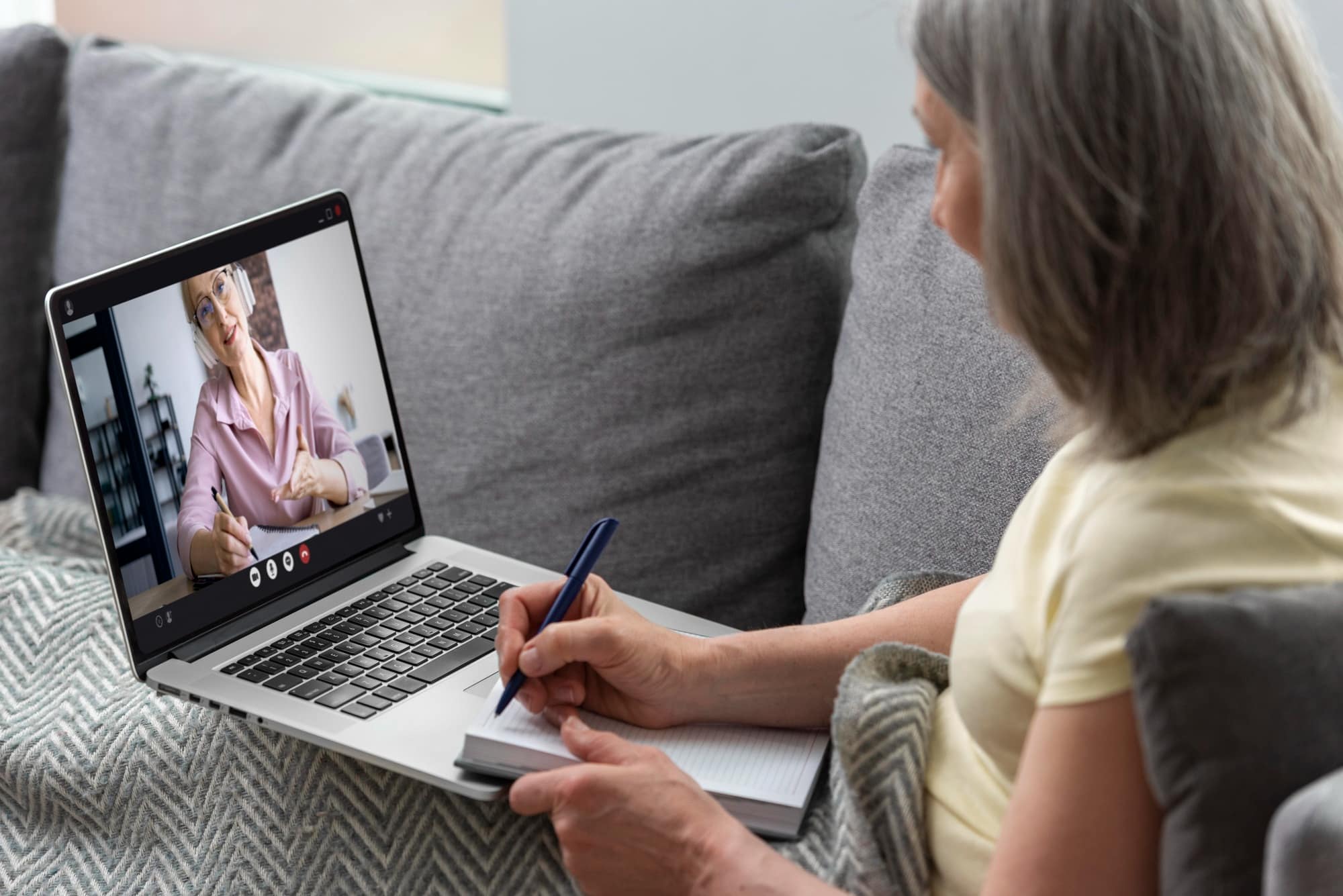How Online Counselling Works (and What First-Time Users Should Know)
Last Updated on June 30, 2025 by Prath

Seeking online counselling might be an option for you if you have a perpetual fear of everyone and everything.
Do you feel judged by other people, even when they’re not paying attention to you? Or do you find yourself more concerned about the future, living each day with dread and panic?
People with anxiety disorders may especially benefit from online therapy, as they can confront their issues in an environment where they feel most at ease.
However, anyone struggling to cope with daily stressors, experiencing conflicts in relationships, or dealing with work-related stress may benefit from talking to a counsellor.
This article discusses how online counselling works, first-time counselling tips and addresses some commonly asked questions about starting therapy.
Online counselling or therapy is a type of psychotherapy where you may talk to a mental health professional via video or audio calls.
Research shows that online counselling is just as effective as in-person counselling.
The biggest benefit of online counselling is the option to attend sessions from anywhere in the world. For example, if you have a busy work schedule, you may not need to wait until you get home to schedule your session.
Find a private space in your office or go to the nearest cafe or library to attend the online session. The prerequisites are a stable internet connection and a device.
People may seek online counselling for several reasons. While some may seek support to navigate day-to-day stressors, others may seek help to manage mental health issues like anxiety or depression.
The reasons for seeking help do not have to fit a particular criterion or checklist. As long as you wish to improve your life and well-being, online counselling can help.
Other than the disorders, online counselling can also help with daily stressors like:

When online counselling first starts, the professional may do the important preparatory work.
Preparation could involve building rapport, getting to know each other, and the online therapist briefing their clients about their working style and approach. Think of it as an orientation.
Tip: During this stage, try to be as open and honest as possible about your presenting problems, feedback on the therapeutic style, and your therapy goals.
Your therapist in Australia will not judge you and may proceed with the therapeutic plan only when both of you are aligned.
If you struggle to ask for what you want, remember that talking to an online therapist is beneficial because you can manage the jitters much more efficiently than when you meet them face-to-face.
After the ‘orientation’, the therapy work begins.
The online therapy process involves addressing issues, processing thoughts, managing bodily reactions, and learning to be proactive and solution-focused.
The real emotional work happens in the middle stage, but do not forget that the beginning stage is just as important. Only after the preparatory work can you truly focus on being open in therapy.
Tip: You may need to discuss and choose the type of therapeutic tools that are most effective for you and that interest you personally.
Do you like art? Are you more interested in introspection through journaling? Do you meditate every day? Talk about your interests in-depth and explain why you like them. Your insight helps the therapist create practical tools—like mindfulness exercises or thought diaries—to align you with your online therapy goals.
In the final stage, you may talk to the therapist about continuing life without or after therapy. This is when the termination work happens.
Note: Even if you’ve found a solution or overcome your presenting problems, you can still continue online counselling in Australia by reducing the frequency of your sessions and addressing other aspects of life, such as self-care, community-building, or goal-setting.
Tip: This stage usually occurs after 20-30 sessions and only if you wish to stop online counselling. At this time, reflect on how you’ve changed and talk to the therapist about equipping yourself with tools to handle the recurrence of symptoms in the future.
Call anxiety is the fear of making or attending phone calls. Although online counselling may be better for people with anxiety issues, attending a session can be just as overwhelming.
However, the good news is that there are several coping techniques you can use to overcome call anxiety. One such tool is the ABCDE Model.
The model is a reflective framework that helps you swap irrational beliefs with rational ones. Try to fill in the sections with your own worries.
A (Adversity) – I can’t talk to a therapist online.
B (Irrational belief) – I’m not capable. I can’t do anything right.
C (Consequence) – I give up on seeking mental health support.
D (Dispute the irrationality) – I have successfully made phone calls before. I deserve high-quality support, and therapists are mental health professionals who are understanding of my problems.
E (Effect of the rational belief) – I attend my first online therapy session and work with my online therapist to talk about my anxiety. I will learn important therapeutic skills that will reduce my anxiety symptoms significantly.
Start online therapy with TYHO from the comfort of your own home. Our internal research shows that it takes less than a minute to book a session on our platform!
The following sections detail the first-time counselling tips to help you get started on the healing journey.
Writing your therapy goals can help you come prepared for the first therapy session.
Take some time out during the weekend and write down bullet points of issues or topics you’d like to cover during therapy. Try to be as detailed as possible.
Write down the major goal (eg relationships), specific aspects of the goal (eg improve communication or reduce arguments), and your past experiences with the issue.
Doing this will help you go into your first online counselling session with confidence.

Most people join their online sessions from home, but you can choose any quiet place with a good internet connection and enough privacy.
It could be your room, your car, or even a quiet spot in a co-working space.
Try to pick a place where you won’t be interrupted, somewhere you can talk freely without worrying about someone overhearing. You’ll probably feel more comfortable opening up if you’re in a space that feels safe and familiar.
Approach your first few online sessions, especially your very first one, with an open mind.
During your initial sessions, your therapist may mainly focus on building rapport and getting to know you, setting therapy expectations, and building a roadmap to achieve your goals.
Keep in mind that building a trusting therapeutic relationship takes time and effort. Give it some time, but remember – you can always change your therapist if you want to.
Online counselling in Australia is similar to in-person therapy in many ways. For example, the session begins with a check-in and later branches out to address specific issues the client may be facing.
However, the difference in mediums depends on the client’s reaction.
If you’re wondering this question yourself, think about this:
Do you feel most vulnerable and honest over a computer, where you can see the therapist, but something makes you feel more comfortable about not existing in the same physical space as them?
If yes, then great! The therapist can help you work on your personal development through the online therapy process.
The difference is that in-person therapy may not have the same impact on you, as you may feel more vulnerable talking through the screen.
Now, think about this:
Do you need that emotional and personal connection that comes with talking to a therapist face-to-face?
If yes, then also great! However, the difference here is the fact that online counselling may make you feel like you don’t share an emotional bond with your therapist, and in-person sessions may work better for you.
To find the right therapist in Australia, ask yourself some questions to narrow down your goals and expectations.
Some questions include:
If you’ve found the right Therapist at TYHO, book an online counselling session here.

Accessibility for Everyone
Online counselling in Australia can be helpful for people who are disabled or unable to leave their household.
While awareness and high-quality support are key aspects of making mental health support accessible, mobility is still a significant barrier for many who are unable to physically meet with a therapist. On a broader scale, sometimes, those with chronic issues or mental illness may also find it hard to step out of the house.
Another example is people living in rural areas or those who cannot find any professional within a reasonable travel distance. Hence, traditional therapy can be restrictive for a select group of people.
Cost-Effectiveness & Convenience
As we’ve already discussed, online counselling is very convenient in that you can book sessions from anywhere with an internet connection.
Along with this, we automatically benefit from another key aspect: cost-effectiveness.
Online therapists in Australia who provide therapy over the phone may have fewer overhead costs (eg renting a private space).
At TYHO, we also offer discounts if you order session packages! So, not only can you save costs on therapy sessions, but you can also avoid other personal expenses related to travel or stacking up on food for an in-person visit.
In fact, recent research in Australia shows that online therapy was cost-saving compared to traditional care in almost 53% of cost-minimalisation studies.
Diverse Choice of Therapists
Recent research shows that distance to services is a common barrier to in-person therapy.
However, online counselling solves this issue for many people by providing a diverse choice of mental health therapists.
More choice = More chance to find the right online therapist
At TYHO, you can filter Therapists by:
The variety of filters, in addition to the Therapist’s introductory videos and comprehensive profile, can help you find someone who truly understands you.
Online counselling can help you achieve your goals no matter where you are.
The online therapy process involves rapport-building, doing therapy work, and termination. Some tips to get started with therapy for beginners include:
The benefits of online therapy include accessibility, cost-effectiveness, and a diverse range of professionals to choose from.
At TYHO, you can find a mental health professional uniquely experienced in the specific issues you may be facing. Help is just one click away. You are not alone. 💜
